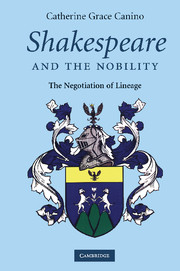Book contents
- Frontmatter
- Contents
- List of illustrations
- List of appendices
- Acknowledgments
- Introduction: the nobility and genealogy
- 1 The Staffords (Dukes of Buckingham)
- 2 The Dukes of Suffolk
- 3 The Nevilles (Earls of Warwick)
- 4 The Talbots (Earls of Shrewsbury)
- 5 The Cliffords (Earls of Cumberland)
- 6 The Stanleys (Earls of Derby)
- 7 The gentry (William Lucy, Lord Saye)
- Conclusion
- Appendices: genealogical charts
- Index
3 - The Nevilles (Earls of Warwick)
Published online by Cambridge University Press: 03 July 2009
- Frontmatter
- Contents
- List of illustrations
- List of appendices
- Acknowledgments
- Introduction: the nobility and genealogy
- 1 The Staffords (Dukes of Buckingham)
- 2 The Dukes of Suffolk
- 3 The Nevilles (Earls of Warwick)
- 4 The Talbots (Earls of Shrewsbury)
- 5 The Cliffords (Earls of Cumberland)
- 6 The Stanleys (Earls of Derby)
- 7 The gentry (William Lucy, Lord Saye)
- Conclusion
- Appendices: genealogical charts
- Index
Summary
Except for the Plantagenets, the Nevilles were the most powerful and prolific family of the fifteenth century. They were not, according to fifteenth-century standards, “old nobility,” having only received an earldom in 1397. Yet by the time of the Wars of the Roses, the family had married into or inherited most of the noble titles of England. Consequently, the majority of Shakespeare's noble characters in the Henry VI trilogy are related in some way to the Nevilles. The Earl of Westmorland, the Duke of Bedford, the Earl of Salisbury, the Archbishop of York, and the Marquess of Montague were Nevilles by surname. The Earl of Northumberland's mother was a Neville. The Duke of York's wife was a Neville. However, in the plays as in history, the most prominent Neville was Richard, sixteenth Earl of Warwick, known as “The Kingmaker” for his influence on the fluctuations of fifteenth-century English politics. When the Kingmaker made the ill-fated and fatal decision to support the wrong king, the title of Warwick became extinct. In the sixteenth century the Earldom of Warwick was revived and bestowed upon the Dudley family (who, through its maternal line, was related to Richard Neville), and throughout Shakespeare's youth the Earl of Warwick was Ambrose Dudley, the brother of Elizabeth's favorite, Robert, Earl of Leicester. The Dudley brothers reigned in their respective earldoms with power and glory throughout the early Elizabethan era.
- Type
- Chapter
- Information
- Shakespeare and the Nobility , pp. 102 - 127Publisher: Cambridge University PressPrint publication year: 2007



